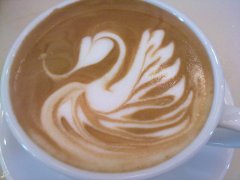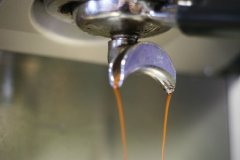Hand-made coffee
Hand-brewed coffee seems to have been invented by the French, but anyway, it was the Japanese who carried it forward.
Therefore, most of the hand washing equipment is Japanese goods.
No matter where he comes from or develops, let's first see what you need for hand washing.
1. Bean grinder
Basically divided into hand grinding and electric grinding.
1. The more common hand grinders are Hario and Zhenghuang, and the former is recommended.
2, electric mill more to go, personal use is SOLIS 166. The scale required for hand punching needs to be thicker, and the uniformity is relatively not so high, but it also needs a certain uniformity. In order to highlight the sense of hierarchy, a certain thickness is necessary. Therefore, cone grinding is preferred.
II. Filter cup
Filter cups are roughly divided into three systems:
1. Filter paper pie
Meilitta-> kalita->V60-> Blue (in order of development)
V60 filter paper
2, cloth filter
flannel
3. Filter pie
Swiss gold KF-2/4
Chemex
Each of these three schools has its own advantages and disadvantages.
Permeation speed: filter cake> filter cake> cloth filter cake
Because coffee steeps for a long time, the alcohol is higher, and the flavor will be relatively low.
So,
Flavors: Filter Pie> Filter Pie> Cloth Filter Pie
Layers: Filter Pie> Filter Paper Pie> Cloth Filter Pie
Cleanliness: cloth filter pie> filter paper pie> strainer pie
Alcohol: cloth filter pie> filter pie> filter paper pie
In filter paper pie, the penetration speed of single hole is not as good as that of three holes, and three holes are not as good as V60(blue shape has not played, let him play soy sauce).
So you can choose which filter cup you prefer.
Because the quality of beans is getting higher and higher, the cleanliness is getting higher and higher. In order to highlight the flavor, I often choose filter or V60 filter paper.
Different filter cups have different filter papers. It is recommended for family users to choose 1-2 servings. The specific reasons will be described at the time of production.
Third, hand flushing pot
There are roughly three shapes below
Kalita's Court Pot
Tiamo Thermometer Pot
Hario's Hand Flushing Pot
Of course, there are enamel pots, but according to the outlet to divide roughly three kinds.
Excluding the maneuverability of each brand, the water output: Tiamo>Hario
The larger the water output, the faster the extraction speed, bringing a certain degree of cleanliness at the same time, the problem is: insufficient extraction.
As far as the control of the pot is concerned, my personal experience is: every pot has a stress point, grasp this stress point, the control of the water flow will be more handy, as for how to grasp this point, that can only try.
Novices suggest filling the pot a little, so that a little feel, easy to control.
Sharing pot
It's not an important question, you can use Hario, you can use glass.
What needs to be noted here is that the scale of many domestic goods is not reliable, so you have to test it yourself.
small accessory
These accessories are actually needed to make coffee.
Thermometer: The importance of temperature to coffee is self-evident.
Electronic scale: make your extraction ratio more accurate.
Timer: digitizes the extraction time.
To be fair, hand flushing is not a very effective extraction method, especially for beginners. The steps are not difficult, but it does take time to practice to make a good cup of hand punch.
A bit of advice for beginners on the appliance:
Hario Hand Mill MSS-1B + Resin V60(V60 Filter Paper)+ Sharing Pot +Tiamo Flushing Pot with Thermometer
The total price does not exceed 400 yuan.
All the tools are ready, let's go!!!
There are many kinds of hand flushing methods, and my method was mentioned in the "Small Company's Hand Washing Extraction Scheme" before.
Here is a brief introduction:
Steaming-> Large flow of water to break up coffee powder, and let the water higher than coffee powder-> Small flow of water to center the hydration, maintain the level-> To the predetermined extraction ratio, stop brewing.
Do a breakdown.
steam
Let the coffee surface fully open, OPEN, OPEN
The water flow here: as thin as possible, so that the coffee powder is fully wetted, and there will be no excess water droplets.
Steaming, you can pay attention to the next, the longer the steaming time, the more fully the coffee taste development.
The larger water flow breaks up the coffee powder and keeps the water above the coffee powder
This is the technical point of this technique.
The purpose is to make coffee powder fully soaked in water, water is higher than coffee powder in order to replenish water, water flow can evenly pass through coffee powder.
The water flow here: a little bigger than when steaming, with a certain momentum to break the coffee powder, and let the water reach a certain height. The finer the water flow in this place, the more complete the extraction.
Small flow center replenishes water and maintains water level
Maintaining a level means that the water supply and dripping into the sharing pot are consistent, and that the coffee extraction is uniform.
The water flow here: It is roughly similar to steaming. It is necessary to pay attention to keeping the water level and the water flow not too fine.
Set an extraction ratio.
According to personal taste experience, if the taste is a little lighter, you can increase the extraction ratio, or adjust the powder to be finer and thicker.
Adding powder or fine powder has the effect of increasing concentration, but it is worth considering that fine powder will highlight flavor, and the amount of powder added is to highlight alcohol. This will be verified by more experiments when we meet in April.
Undoubtedly, the most important thing in hand flushing is the control of water flow. The speed and strength of water injection are very important. When it comes to family selection filter cups, the reason for generally choosing 1-2 portions is that the small filter cups are relatively shallow, and in the case of less powder, the height of water injection is relatively low.
The large filter cup is relatively deep and the water injection height is relatively high. According to the analysis of relevant people, it may be a little more wild. This remains to be discussed. However, when the injection height is high, the control degree of water flow decreases obviously.
The flushing speed directly affects the concentration and extraction rate. Individuals rarely change the flushing speed, and the controllability is not high (the main technology is relatively poor). Changing the powder degree and extraction ratio is more intuitive and effective.
The reason why I don't pay much attention to the technique is that there are too many kinds of techniques, each of which has its own reason. I think it is better to think clearly about the reason of the technique used by myself.
Important Notice :
前街咖啡 FrontStreet Coffee has moved to new addredd:
FrontStreet Coffee Address: 315,Donghua East Road,GuangZhou
Tel:020 38364473
- Prev

The main classification of coffee flower
First, what is directly poured into the forming method is that the foamed cow is still quickly poured into the espresso without the separation of milk and milk foam, and after the milk, milk foam and espresso are merged to a certain saturated state, the shaking technique of the hand is used to make the foam and milk float on the Italian espresso and make use of all kinds of espresso.
- Next

The art of coffee flower drawing
The coffee pull is a change made on the original cappuccino or latte.
Related
- Beginners will see the "Coffee pull flower" guide!
- What is the difference between ice blog purified milk and ordinary milk coffee?
- Why is the Philippines the largest producer of crops in Liberia?
- For coffee extraction, should the fine powder be retained?
- How does extracted espresso fill pressed powder? How much strength does it take to press the powder?
- How to make jasmine cold extract coffee? Is the jasmine + latte good?
- Will this little toy really make the coffee taste better? How does Lily Drip affect coffee extraction?
- Will the action of slapping the filter cup also affect coffee extraction?
- What's the difference between powder-to-water ratio and powder-to-liquid ratio?
- What is the Ethiopian local species? What does it have to do with Heirloom native species?

